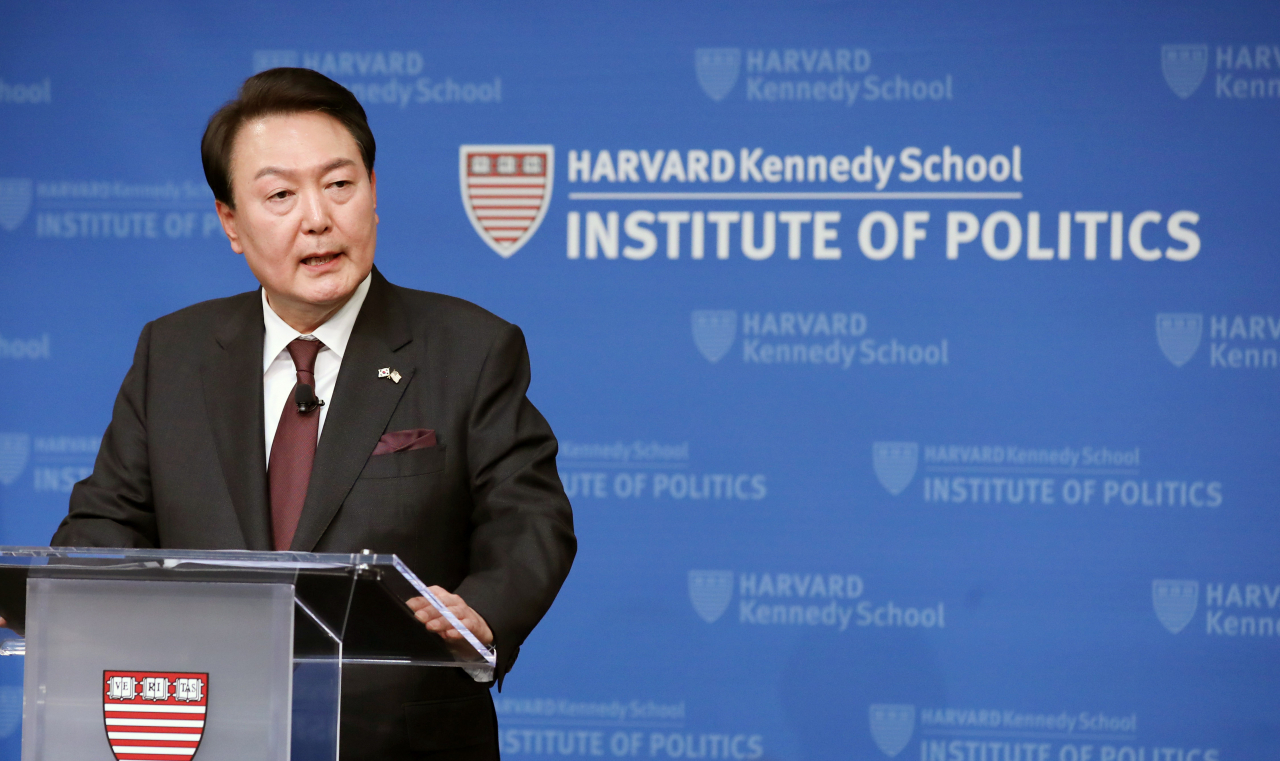Yoon says Washington Declaration is 'upgraded' version of Mutual Defense Treaty
By YonhapPublished : April 29, 2023 - 10:55

BOSTON -- President Yoon Suk Yeol said Friday that South Korea's new nuclear deterrence agreement with the United States should be understood as an "upgraded" version of the allies' 1953 Mutual Defense Treaty.
Yoon made the remark during a discussion held at Harvard Kennedy School, referring to the Washington Declaration he adopted with US President Joe Biden at their summit in Washington on Wednesday.
Under the deal, the allies agreed to share information on nuclear and strategic operations and planning, and regularly deploy US strategic assets to South Korea, to enhance the credibility of the US extended deterrence commitment to its ally.
Extended deterrence refers to the US commitment to mobilizing all of its military capabilities, including nuclear, to defend its ally.
"We're now in a situation where the 1953 Mutual Defense Treaty based on conventional weapons has to be upgraded to the concept of South Korea-US mutual defense that includes nuclear weapons," Yoon said of the Washington Declaration.
"North Korea's nuclear weapons are not far away but the danger is right in front of us, and in a very specific way," he said.
The Mutual Defense Treaty was signed between South Korea and the US after the end of the 1950-53 Korean War and formed the basis for the bilateral alliance that marks its 70th anniversary this year.
Yoon noted the declaration stipulates not only the US' obligations but also South Korea's obligations to not develop nuclear weapons of its own under the Nuclear Nonproliferation Treaty.
The calls within South Korea for the country's own nuclear armament appear to be based on a simple calculation that because North Korea is advancing its nuclear capabilities, South Korea should too, given that it is technically capable, he said.
"If the Republic of Korea were to decide to arm itself with nuclear weapons, we have the technical foundation to do so within a short period of time, even within a year," Yoon said, referring to South Korea by its formal name.
But possessing nuclear weapons is not simply about the technical capability, but also about a "complicated political and economic equation," he said.
"There are various values and interests we have to give up if we possess nuclear weapons," he said.
Yoon expressed confidence the declaration will survive any change in administration in the US.
He also argued the agreement is more effective than the North Atlantic Treaty Organization's nuclear-sharing arrangement because it involves only two parties.
When asked by Joseph Nye, Harvard University distinguished service professor, emeritus, whether the declaration could lead to tensions between South Korea and China, Yoon suggested China was partly to blame for North Korea's growing threat.
"The nuclear threat has become incredibly concrete because the U.N. Security Council members did not fully cooperate even in cases of a violation of Security Council resolutions," he said.
China and Russia, both permanent members of the Security Council, have frequently opposed strengthening sanctions on North Korea over its nuclear and ballistic missile programs.
Still, Yoon said South Korea seeks a healthy relationship with China.
"We are always working to pursue common interests for the two countries based on mutual respect," he said.
On the question of whether South Korea could provide lethal aid to Ukraine in its war with Russia, Yoon said his government is closely following developments on the battlefield.
"Depending on the situation on the battlefield, we will work to defend international rules and international law together with the international community," he said. "That could include various options."
Yoon also defended his commitment to improving relations with Japan, saying South Korea must "overcome the belief that we can't take one step further unless historical issues are resolved."
"I know there could be a lot of emotional conflict and antagonism related to the colonial period among our people," he said, referring to the suffering of Koreans under Japan's 1910-45 colonial rule.
"But if we cooperate well for the future, I believe our conflict and hostility about the past will be healed to a large extent," he said.
Ahead of the discussion, Yoon gave a speech on freedom and solidarity, saying the international community should respond to attempts to change the status quo by force with courageous and resolute solidarity. (Yonhap)





![[KH Explains] No more 'Michael' at Kakao Games](http://res.heraldm.com/phpwas/restmb_idxmake.php?idx=644&simg=/content/image/2024/04/28/20240428050183_0.jpg&u=20240428180321)













![[Herald Interview] Mistakes turn into blessings in street performance, director says](http://res.heraldm.com/phpwas/restmb_idxmake.php?idx=652&simg=/content/image/2024/04/28/20240428050150_0.jpg&u=20240428174656)
